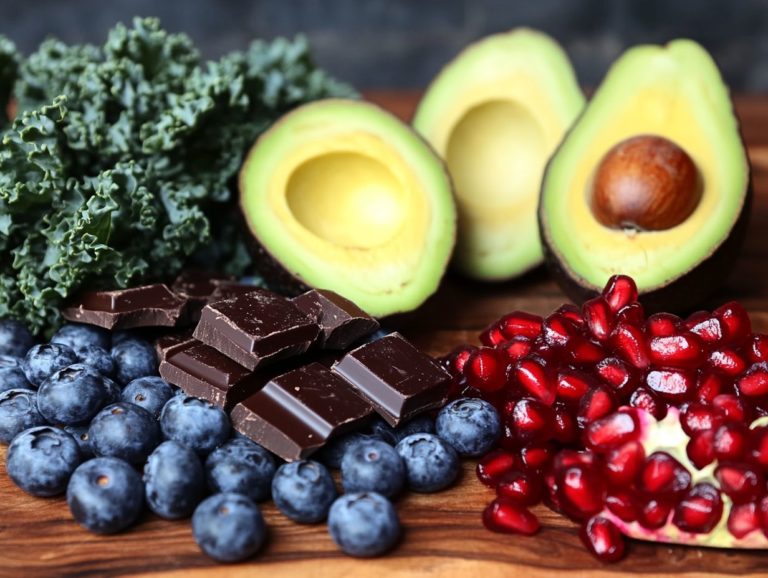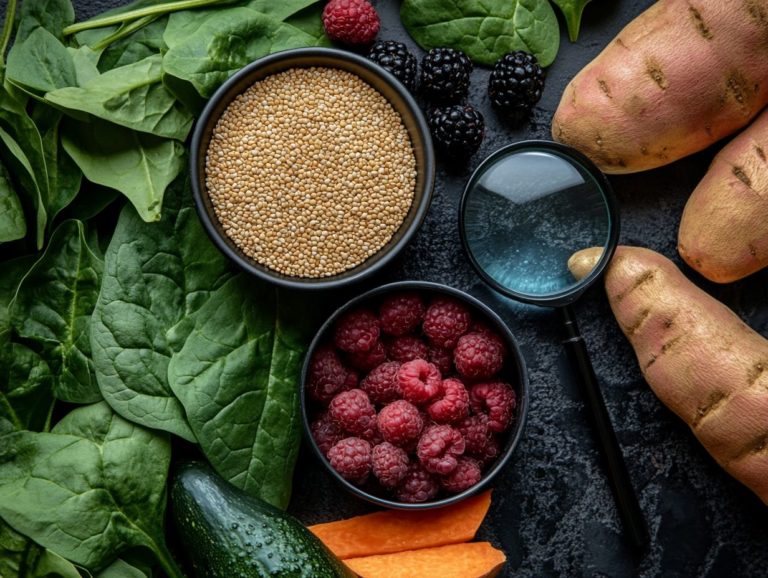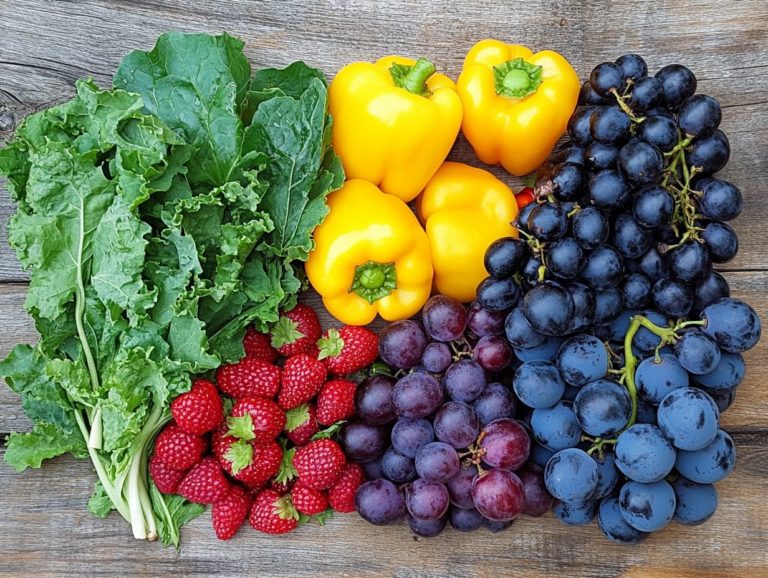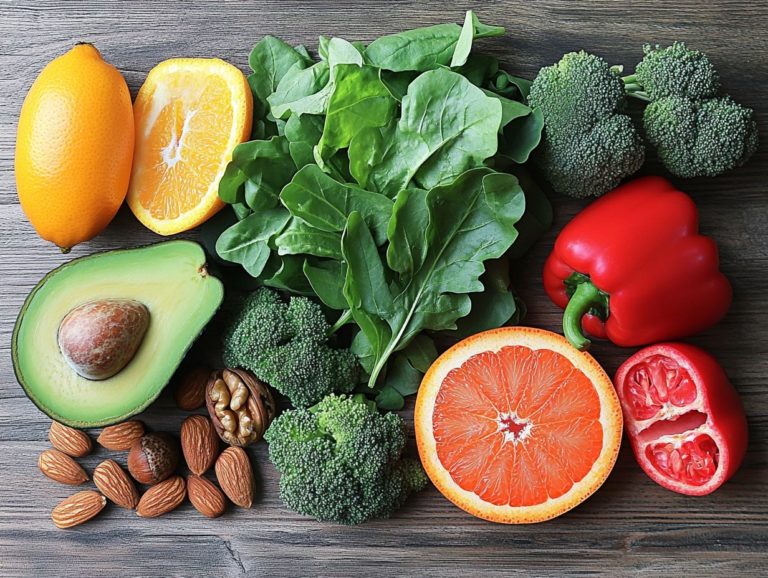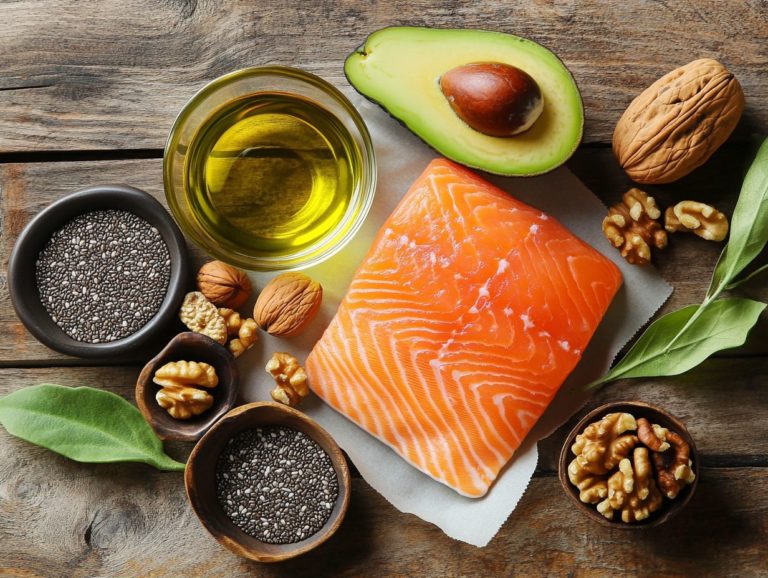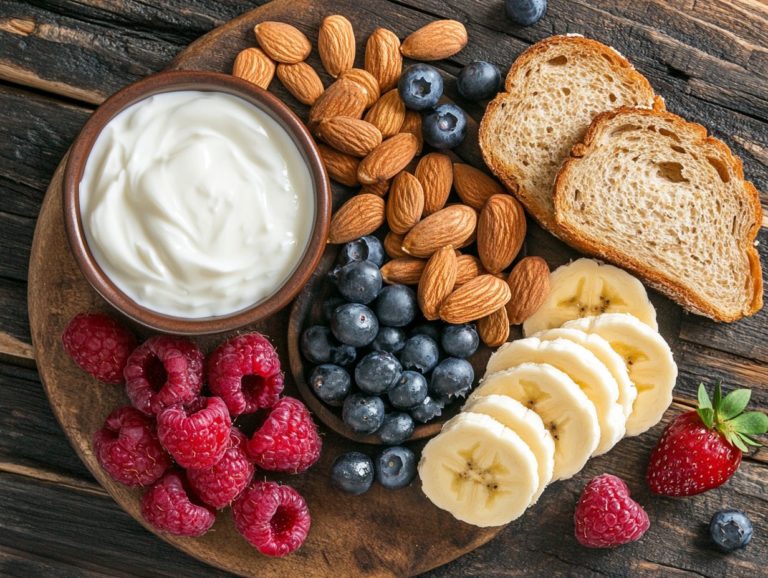5 Best Sources of Nutrients for Vegetarians
Adopting a vegetarian diet can be a truly rewarding choice, enhancing your health, aligning with ethical values, and promoting sustainability. However, ensuring you receive all the essential nutrients can be a bit of a challenge.
This article delves into the top five nutrient sources you should weave into your meals:
- Legumes
- Nuts and seeds
- Whole grains
- Leafy greens
- Fortified foods
It also tackles common concerns regarding protein, calcium, iron, and other nutrients that might be on the sparse side. Discover how to nourish your body while savoring delightful vegetarian dishes!
Contents
- Key Takeaways:
- 1. Legumes
- 2. Nuts and Seeds
- 3. Whole Grains
- 4. Leafy Greens
- 5. Fortified Foods
- Key Nutrients Every Vegetarian Needs
- How Can Vegetarians Ensure They Are Getting Enough Protein?
- What Are Some Other Sources of Calcium for Vegetarians?
- What Are Some Tips for Incorporating These Nutrient Sources into a Vegetarian Diet?
- How Can Vegetarians Ensure They Are Getting Enough Iron?
- What Are Some Other Nutrients That Vegetarians May Be Lacking?
- Frequently Asked Questions
- What are the 5 best sources of nutrients for vegetarians?
- Why are legumes a good source of nutrients for vegetarians?
- How can vegetarians get enough protein from whole grains?
- What makes nuts and seeds important for vegetarian diets?
- How can vegetarians ensure they get enough vitamins and minerals from fruits?
- Why are vegetables considered the cornerstone of a vegetarian diet?
Key Takeaways:
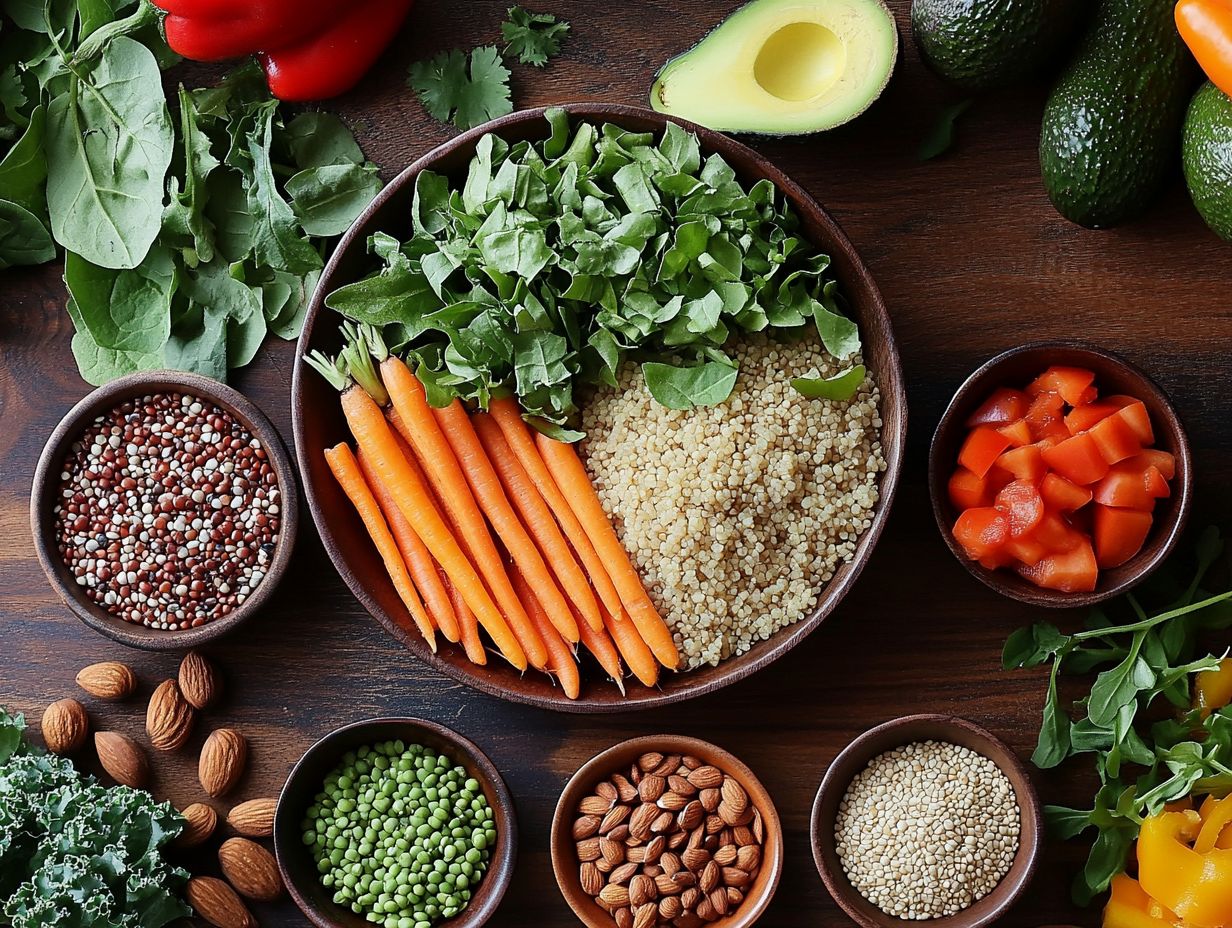
Legumes are a great source of essential nutrients for vegetarians, including protein, iron, and fiber. For those following a healthy eating plan, including the Mediterranean diet, they can be easily incorporated into meals in the form of beans, lentils, and peas, highlighting the 5 best sources of nutrients.
Nuts and seeds are rich in healthy fats, protein, and minerals like magnesium and zinc. They can be eaten as snacks or added to salads, smoothies, and stir-fries to boost nutrient intake for vegetarians.
Whole grains are not only a good source of energy but also provide vegetarians with important nutrients like B vitamins, iron, and fiber. Quinoa, brown rice, and whole wheat pasta are some options to include in a vegetarian diet.
1. Legumes
Legumes, such as beans, lentils, and peas, are important for vegetarians. They provide a rich source of protein along with vital nutrients like iron and calcium.
Legumes meet your protein needs and are rich in fiber. This promotes healthy digestion and can assist in weight management.
As valuable components of dietary guidelines for vegetarians, legumes bring unique flavors and textures that elevate a variety of dishes. Whether you delight in a hearty chili or savor creamy hummus, the nutritional benefits of legumes extend well beyond just protein.
They significantly contribute to heart health and help stabilize blood sugar levels, proving that they truly deserve their title as a superfood in the plant-based realm.
2. Nuts and Seeds
Nuts and seeds are not just delightful treats; they re also nutritional powerhouses. Packed with essential omega-3 fatty acids healthy fats that are good for your heart they serve as valuable protein sources that can elevate your healthy diet.
These tiny gems are brimming with vitamins and minerals like magnesium, zinc, and vitamin E. All of these play a vital role in bolstering heart health and enhancing nutrient absorption within your body.
Incorporating a variety of these foods such as walnuts, almonds, chia seeds, and flaxseeds into your daily meals is a breeze. Toss them into smoothies, sprinkle them on salads, or mix them into yogurt.
Each type brings its own unique flavor profile and health benefits, allowing you to enjoy a nutritional boost while effortlessly enhancing the taste of your favorite dishes.
3. Whole Grains
You ll find whole grains in many delicious forms, serving as a robust source of starchy carbohydrates and high fiber that supports digestion and delivers an array of health benefits. They re a top choice for anyone seeking balanced meals.
Quinoa, brown rice, barley, and whole wheat provide you with endless options for incorporating them into your daily meals. Not only do they act as a steady energy source, perfect for active lifestyles, but their high fiber content also plays a crucial role in regulating digestive health.
In a vegetarian diet, you can easily add whole grains to salads, soups, and side dishes, ensuring a well-rounded nutrient profile. By regularly including these grains in your meals, you can effectively combat nutrient deficiencies and promote your overall well-being.
Start exploring these nutrient-packed foods today for a healthier you!
4. Leafy Greens
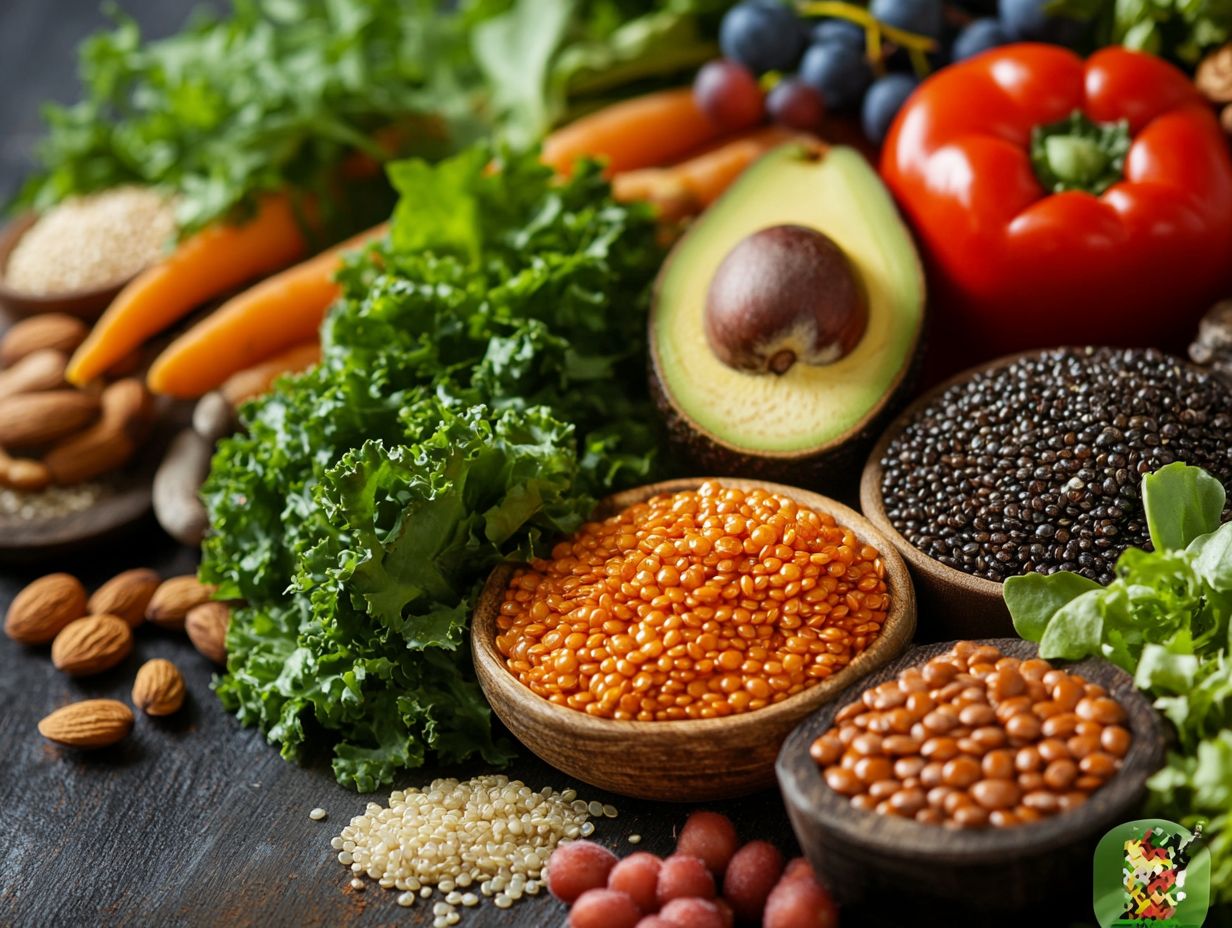
Leafy greens are more than just food; they are nutritional powerhouses! Greens such as spinach, kale, and Swiss chard are brimming with essential vitamins and minerals. They offer important sources of calcium and iron that are vital for meeting dietary needs, particularly for vegetarians with specific restrictions.
These greens also deliver vital nutrients such as vitamin K, key for maintaining blood health, and folate, essential for cell division and sustaining your energy levels. By incorporating these greens into your daily meals, you can enhance your immune function and support healthy bones.
If you re looking to elevate your vegetarian diet, consider:
- Blending these greens into smoothies
- Tossing them into salads
- Adding them to stir-fries
Experiment with cooking methods like steaming or saut ing, as these not only help to retain nutrients but also enhance flavor. Don’t miss out on these nutrient-rich options!
5. Fortified Foods
Fortified foods play an essential role in addressing potential nutrient deficiencies in your vegetarian diet, particularly for vital vitamins such as B12, which is absent in plant-based options.
By choosing these foods, you can ensure your dietary choices support your health needs. Add fortified foods to your meals to combat deficiencies that may arise from a diet devoid of animal products. The significance of fortified foods is immense, offering a practical pathway to achieving a well-balanced and healthful vegetarian lifestyle.
Many brands of plant-based milk, breakfast cereals, and nutritional yeast are fortified not just with vitamin B12, but also with other crucial nutrients like vitamin D and iron. Incorporating fortified foods can profoundly enhance the nutritional quality of your vegetarian diet, allowing you to meet your daily vitamin and mineral requirements with ease.
Key Nutrients Every Vegetarian Needs
For vegetarians, ensuring a sufficient intake of essential nutrients is crucial for maintaining health and well-being. Focus particularly on protein, calcium, vitamin B12, and omega-3 fatty acids, as these nutrients play significant roles according to dietary guidelines. Additionally, exploring the best sources of nutrients for athletes can help contribute to a well-rounded nutritional profile.
You can effectively source these nutrients from a variety of plant-based foods, but it’s essential to remain vigilant about potential deficiencies that could impact your overall health. For instance, while legumes and nuts can serve as excellent protein sources, incorporating the 5 best whole foods for better nutrition may also be beneficial. Additionally, you may need to seek out fortified foods or supplements for vitamin B12, which is primarily found in animal products.
If you re pregnant or breastfeeding while following a vegetarian diet, it s especially important to pay attention to your intake of folate and iron to support fetal development and maintain your own health during these critical stages of life.
How Can Vegetarians Ensure They Are Getting Enough Protein?
To ensure you re getting adequate protein, focus on incorporating a variety of protein sources into your meals, such as legumes, nuts, and seeds. Employing smart meal planning strategies will help you meet your dietary needs while reaping health benefits.
By thoughtfully combining these protein sources, you can create meals that satisfy your hunger and provide a complete spectrum of essential amino acids. For example, pairing rice with beans or adding nuts to your salad can significantly boost the protein content.
Planning your meals in advance allows for diversity in your diet, making it easier to integrate foods like quinoa, tofu, and dairy alternatives. Don t shy away from experimenting with different recipes; keeping your meals exciting ensures that you cover a variety of nutrients.
With a touch of creativity and a bit of preparation, you can effortlessly meet your protein requirements while enjoying a delightful array of vegetarian dishes.
What Are Some Other Sources of Calcium for Vegetarians?
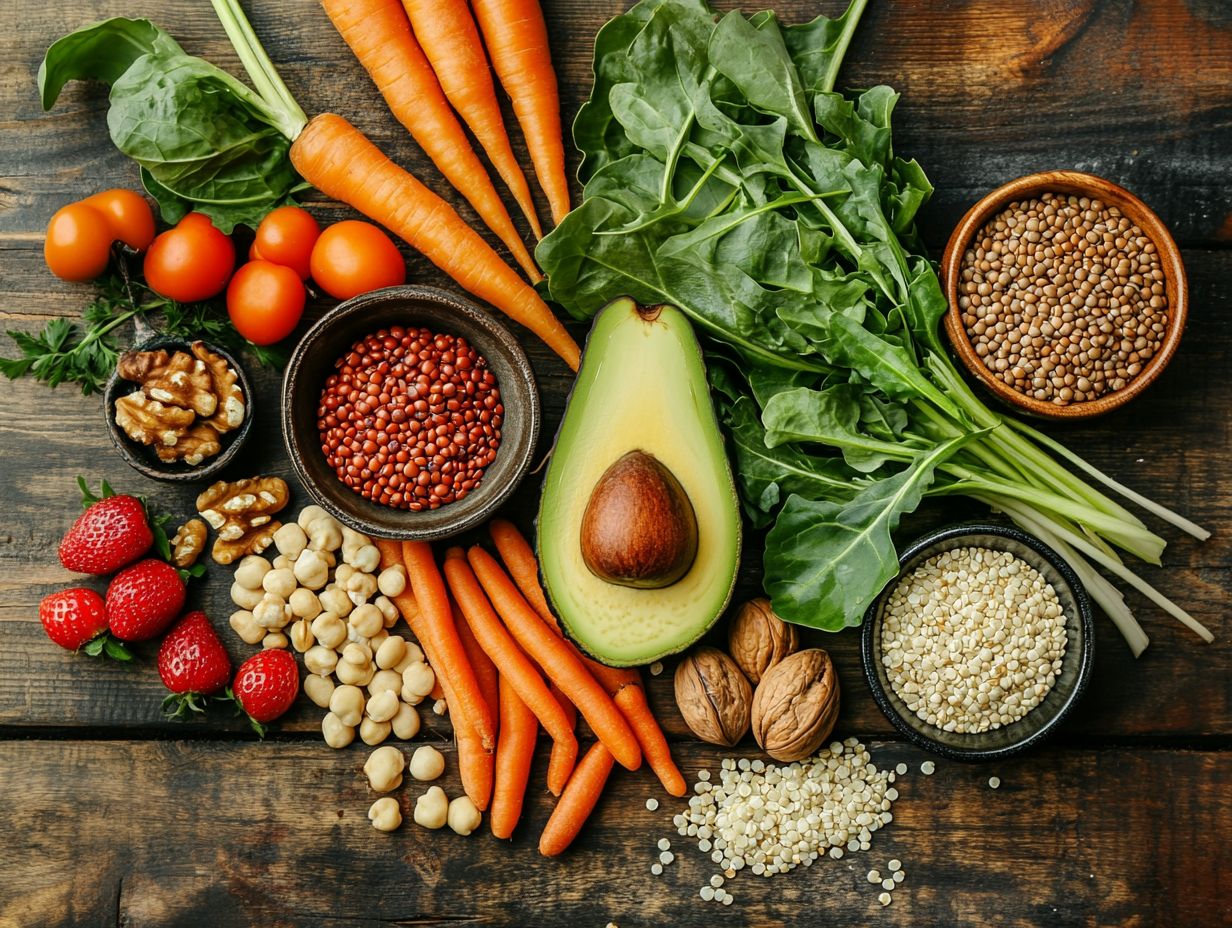
For vegetarians looking to diversify their calcium sources beyond dairy, there are plenty of excellent options available. Incorporating nutrient-dense foods for a healthy diet, such as dairy alternatives, leafy greens, and fortified cereals, can deliver essential nutrients while promoting overall health.
Exploring these varied food choices provides numerous opportunities to meet your daily calcium needs. Foods like almond milk, tofu, and tempeh not only enhance your calcium intake but also introduce delightful flavors and textures that elevate countless dishes.
Incorporating spinach, kale, or broccoli into your salads or smoothies enriches your meals with nutrients without compromising on taste. Choosing snacks such as chia seeds or almonds is a convenient way to boost your calcium levels throughout the day.
With a dash of creativity in the kitchen, you can enjoy a well-rounded diet that’s not just rich in calcium but also supports your overall health and vitality.
What Are Some Tips for Incorporating These Nutrient Sources into a Vegetarian Diet?
Incorporating a diverse range of nutrient sources into your vegetarian diet requires intentional meal planning and a keen focus on variety. This means embracing an array of fruits, vegetables, and the best plant-based sources of protein to support your overall well-being.
To effectively meet your dietary needs, striking a balance of proteins, fats, and carbohydrates in each meal is essential. Think of legumes, nuts, and seeds as stellar protein sources. Don’t forget to include a vibrant mix of colorful vegetables to boost your nutrient intake.
This approach not only helps keep your hunger at bay but also prevents common deficiencies, particularly in important nutrients like vitamins B12 and D, iron, and omega-3 fatty acids.
Meal prepping in advance can simplify this process, allowing you to choose nutrient-rich options each day while keeping your culinary journey exciting and enjoyable.
How Can Vegetarians Ensure They Are Getting Enough Iron?
To ensure you re getting enough iron, focus on incorporating rich sources like legumes and leafy greens into your diet. Pairing these with vitamin C-rich foods enhances iron absorption and helps fend off potential deficiencies.
Don t overlook nuts and seeds; they can significantly contribute to your iron intake, even though they re often sidelined in discussions about a balanced diet. If you have dietary restrictions, such as avoiding gluten or dairy, it’s especially important to monitor your iron levels.
You can enhance your iron intake by cooking with cast iron pots. This simple change can leach some iron into your meals, turning your cooking routine into an effortless way to boost your iron intake without requiring major dietary shifts.
What Are Some Other Nutrients That Vegetarians May Be Lacking?
As a vegetarian, you may find yourself at risk for certain nutrient deficiencies, particularly in important nutrients like vitamin B12, omega-3 fatty acids, and iron. Staying informed and taking proactive steps to cultivate a well-rounded diet is essential for your health.
These nutrients play crucial roles in maintaining your energy levels, enhancing brain function, and supporting your overall well-being. For example, vitamin B12 is vital for nerve function and the production of red blood cells. Omega-3 fatty acids support heart health and cognitive performance, while iron is key for transporting oxygen throughout your body.
Fight these potential deficiencies by embracing nutrient-rich foods! Consider incorporating fortified foods like plant-based milks and cereals into your diet, alongside these nutrient-dense options:
- Chia seeds
- Lentils
- Dark leafy greens
Some individuals may benefit from exploring supplements, but it s wise to consult with a healthcare professional to ensure you’re effectively meeting your dietary needs.
Frequently Asked Questions
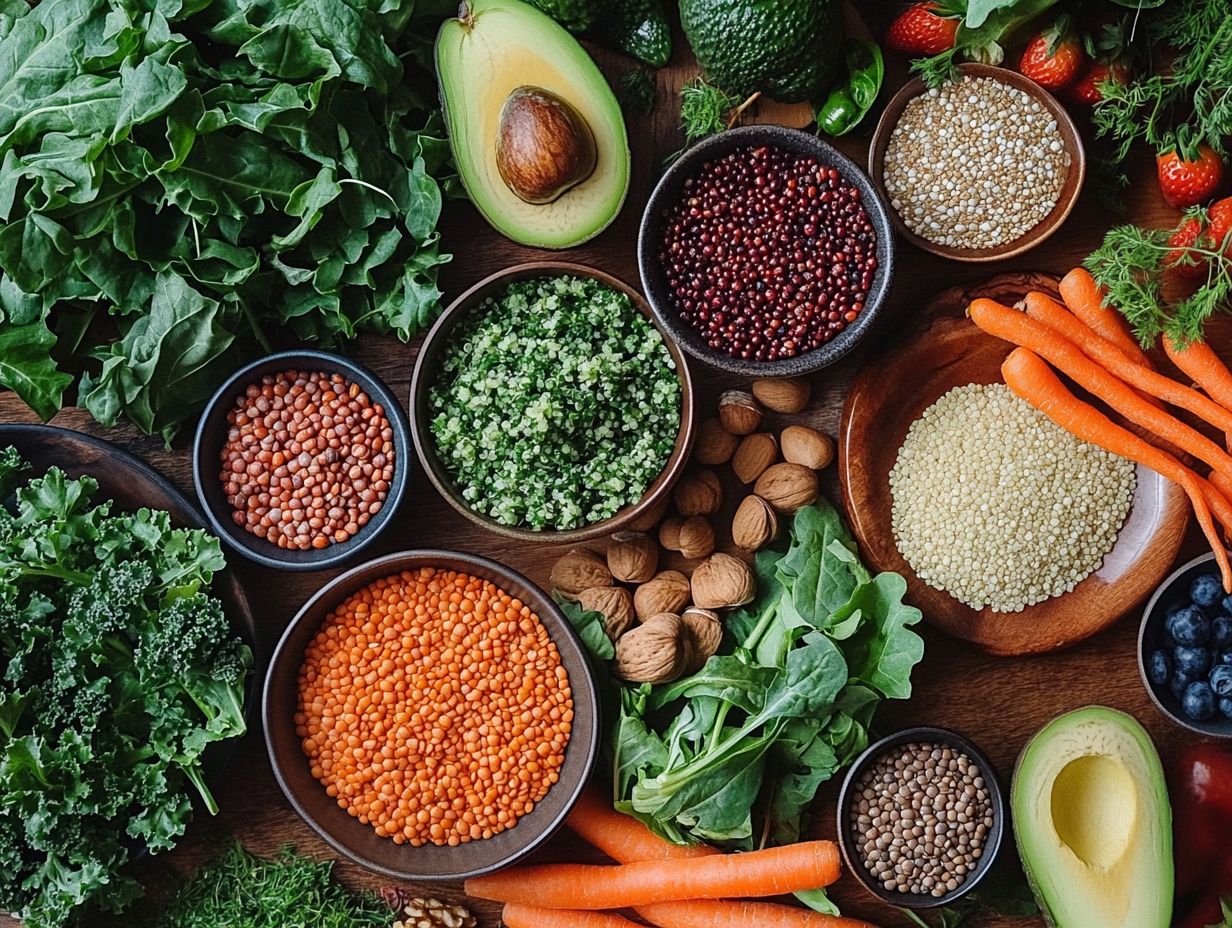
What are the 5 best sources of nutrients for vegetarians?
The 5 best sources of nutrients for vegetarians are legumes, whole grains, nuts and seeds, fruits, and vegetables.
Why are legumes a good source of nutrients for vegetarians?
Legumes, like beans, lentils, and chickpeas, are packed with protein. They also provide iron, zinc, and folate, making them a fantastic source of nutrients for athletes and a great option for vegetarians.
How can vegetarians get enough protein from whole grains?
Whole grains, such as quinoa, brown rice, and oats, are rich in protein. They contain all essential amino acids, offering a complete protein for vegetarians.
What makes nuts and seeds important for vegetarian diets?
Nuts and seeds are fantastic sources of healthy fats and protein. They also provide essential minerals like magnesium, calcium, and zinc, making them vital for a vegetarian diet.
How can vegetarians ensure they get enough vitamins and minerals from fruits?
Fruits are loaded with essential vitamins and minerals. They are especially rich in vitamin C, folate, and potassium, making them key for vegetarians.
Why are vegetables considered the cornerstone of a vegetarian diet?
Vegetables are packed with fiber, vitamins, and minerals while being low in calories. This makes them a crucial part of a vegetarian diet and essential for overall health.

